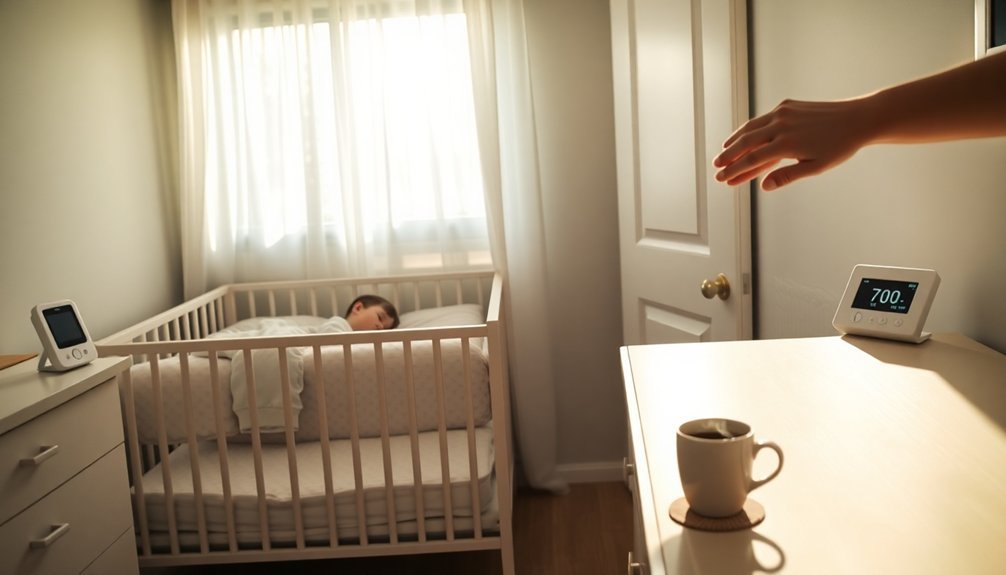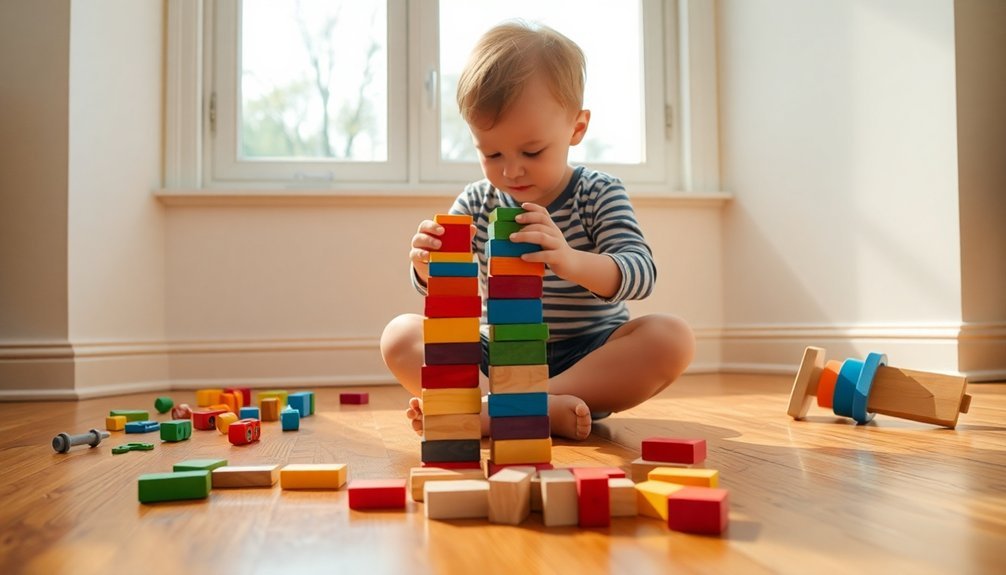You've probably heard other parents say it gets easier around the six-month mark, but that's only partially true. While certain milestones like sleep training and established feeding schedules can provide relief, parenting evolves rather than simply becoming "easier." Each stage brings its own unique set of challenges and rewards, from the physical demands of infancy to the emotional complexities of the teenage years. What really changes is your ability to handle these challenges and your growing confidence as a parent. Understanding these natural changes can help you navigate the journey ahead with realistic expectations and practical strategies.
Key Takeaways
- Initial relief comes at 4-6 months when babies develop regular sleep patterns and better head control, reducing physical caregiving demands.
- Major improvements occur at 6-12 months through successful sleep training, leading to better nights and reduced parental exhaustion.
- School entry at age 5-6 brings financial relief from daycare costs and establishes structured routines for daily activities.
- Ages 7-10 show significant ease as children develop social competence, self-regulation, and independence in daily tasks.
- The teenage years bring transportation independence, while the empty nest phase allows parents to reinvest in personal interests.
The First Major Breakthrough
Parents typically experience their first significant relief from intensive caregiving when their child reaches 4-6 months of age. At this stage, your baby's sleep patterns begin to regulate, and they can often sleep for longer stretches at night.
You'll notice their first milestones emerging as they develop better head control, start rolling over, and show increased hand-eye coordination. This period marks an essential shift in your parenting journey.
Your infant's digestive system matures, reducing episodes of colic and reflux. They're also becoming more predictable with feeding schedules, which helps you establish reliable daily routines.
The emotional bonding that began at birth deepens as your baby starts responding with social smiles, laughs, and reciprocal interactions.
Research shows that this 4-6 month window represents a developmental leap when babies begin processing their environment more effectively.
You'll find yourself spending less time on survival-mode caregiving and more time enjoying interactive play. While challenges remain, this breakthrough period often brings renewed energy and confidence to your parenting experience.
Many parents report feeling more competent and connected to their child during this stage.
Sleep Training Success

Nighttime peace arrives for many families between 6-12 months when sleep training efforts begin showing consistent results.
You'll notice your child's ability to self-soothe improves as you implement consistent sleep methods and establish predictable nighttime routines. Research shows that parental consistency during this phase directly impacts your child's sleep patterns and emotional regulation.
Your child's natural resilience will emerge as you maintain boundaries while offering emotional support during the change.
You'll find that creating an ideal sleep environment, combined with gradual adjustments to bedtime habits, reduces nighttime wakings. Whether you're using gentle comforting techniques or structured reward systems, your commitment to the process matters more than the specific method chosen.
As your child develops positive sleep associations, you'll experience fewer bedtime battles and more restful nights.
Studies indicate that successful sleep training not only improves your child's mood and cognitive development but also reduces parental stress levels.
Remember that setbacks during illness or developmental leaps are normal, but maintaining your established routines will help you quickly return to peaceful nights.
School Years Begin

Building on the sleep foundations established in earlier years, many families experience a welcome shift in daily routines when their child starts school around age 5-6.
You'll notice your child developing greater independence and social awareness, though school adjustments can initially feel overwhelming for both you and your child. Research shows that establishing consistent homework routines early can minimize future homework battles.
As you navigate teacher relationships and parent involvement opportunities, you'll find a new rhythm in schedule balancing. Your child's exposure to peer influences and social dynamics will expand considerably, requiring ongoing conversations about behavior expectations and healthy friendships.
While academic pressures may begin to surface, remember that your supportive presence matters more than perfect performance.
Studies indicate that children who participate in manageable extracurricular activities show improved self-regulation and social skills. However, you'll want to avoid over-scheduling, which can lead to stress and burnout.
Instead, focus on maintaining open communication with your child's teachers and creating a balanced approach to school-related responsibilities. This period often marks the beginning of more predictable routines and increased emotional regulation in children.
Independent Daily Routines

As children progress through elementary school, their capacity for managing daily tasks independently shows marked improvement, typically around ages 7-9.
You'll notice your child can now handle morning routines like getting dressed, brushing teeth, and preparing basic breakfast items with minimal supervision. This developmental milestone considerably reduces your hands-on involvement in basic care tasks.
Your child's growing autonomy extends to independent play, where they'll engage in sustained activities without constant direction.
You'll find them capable of entertaining themselves for longer periods, whether through reading, crafting, or imaginative play. This self-directed behavior allows you to complete your own tasks while remaining nearby for occasional guidance.
Daily chores become more manageable as your child develops better motor skills and understanding of responsibilities.
They can now handle tasks like making their bed, sorting laundry, feeding pets, and keeping their belongings organized.
Research indicates that children who participate in age-appropriate household responsibilities develop stronger executive functioning skills and time management abilities.
You'll observe that while they still need reminders, they're increasingly capable of following through on routine expectations.
Communication Gets Clearer

Most parents experience a notable shift in communication dynamics as their children reach ages 6-8. During this developmental stage, you'll notice your child's ability to engage in clear conversations improves dramatically, making daily interactions more meaningful and less frustrating.
Your child's expanding vocabulary and growing emotional intelligence enable more sophisticated exchanges about feelings, needs, and thoughts.
Research shows that effective listening skills develop notably during these years, allowing for more nuanced parent-child interactions. You'll find yourself having more productive discussions about:
- Complex emotions and how to manage them
- Logical consequences of actions and behaviors
- Personal responsibilities and expectations
- Social situations and relationship dynamics
As your child's cognitive abilities mature, you'll discover they can better understand abstract concepts and follow multi-step instructions.
This enhanced communication capacity reduces misunderstandings and tantrums that often stem from inability to express needs. You'll spend less time decoding their messages and more time engaging in meaningful dialogue.
This progression transforms your relationship from primarily caretaking to including more collaborative problem-solving and mutual understanding.
Social Skills Take Shape

The development of social skills accelerates greatly between ages 7-10, marking an essential period when children begin forming more complex peer relationships and understanding social dynamics.
You'll notice your child's peer interactions becoming more sophisticated as they develop the ability to empathize, compromise, and navigate group situations independently.
During this stage, your child's emotional intelligence expands greatly. They're learning to read social cues, understand non-verbal communication, and recognize the impact of their behavior on others.
You'll find yourself mediating fewer playground conflicts as they develop problem-solving strategies and conflict resolution skills on their own.
This period also brings a shift in how your child processes friendship. They're moving beyond simple playmate relationships into deeper, more meaningful connections based on shared interests and values.
You'll observe them developing social awareness, including the ability to adapt their behavior to different social contexts – whether they're at school, sports practice, or family gatherings.
This newfound social competence often translates into reduced parental intervention in their daily social interactions, making this aspect of parenting remarkably easier.
Self Regulation Emerges

Parallel to social development, children ages 7-10 demonstrate significant advances in their ability to regulate emotions and behavior. This emerging self-control represents an essential milestone in emotional maturity, making parenting especially less demanding.
You'll notice your child developing more sophisticated behavior management strategies as their brain's prefrontal cortex continues to mature.
During this period, you'll observe these key improvements in self-regulation:
- Greater impulse control, allowing your child to pause and think before acting on immediate desires
- Enhanced ability to identify and articulate complex emotions, reducing tantrum frequency
- Improved frustration tolerance when facing challenging tasks or disappointments
- Increased capacity to follow multi-step instructions without constant supervision
These developments mean you won't need to provide constant behavior management support. Your child's growing emotional maturity enables them to handle everyday challenges more independently.
While they'll still need your guidance, you'll find yourself shifting from active behavior controller to supportive coach. This change marks a significant turning point in your parenting journey, as your child's self-regulation skills continue to strengthen throughout middle childhood.
Financial Relief Points

Financial milestone markers throughout your child's development bring welcome relief to household budgets, particularly as children reach school age. The greatest financial easing typically occurs when your child begins public school education, eliminating the substantial cost of full-time daycare.
You'll notice your budgeting strategies can become more flexible during this change.
As your child moves through elementary years, you'll experience decreased expenses for basic care items like diapers, formula, and specialized baby equipment. However, it's crucial to redirect these savings toward new developmental needs and unexpected expenses that arise with school-age children, such as extracurricular activities and educational supplies.
Another significant relief point emerges when your child reaches driving age, though this initially requires investment in driver's education and insurance. The transportation independence reduces your time commitment and associated costs of serving as their primary transportation source.
The final major financial shift typically occurs when your child moves toward independence, either through college or career paths, allowing you to gradually decrease direct financial support while maintaining emergency reserves for unexpected needs during their journey to adulthood.
Empty Nest Transition

The empty nest phase prompts you to reconstruct your identity beyond your role as a parent, particularly as your adult children establish independent lives.
You'll likely experience a mix of pride and loss during this shift, which research shows is a normal psychological response to this significant life change.
This period offers an opportunity to reinvest in personal interests, career goals, and relationships that may have taken a back seat during active parenting years.
Rediscovering Personal Identity
While many parents initially struggle with the empty nest change, research indicates this phase often becomes a catalyst for personal rediscovery and growth.
During your parenting years, personal hobbies and self-care routines may have taken a back seat to your children's needs. Now's your opportunity to focus on rediscovering passions and maintaining friendships that might've been neglected.
Mental wellness experts suggest focusing on these key areas for successful personal identity development:
- Establish dedicated time blocks for exploring interests, whether it's learning a new language, taking art classes, or joining community groups.
- Create structured self-care routines that prioritize your physical and emotional health through exercise, meditation, or therapeutic activities.
- Develop creative outlets that allow for self-expression and personal achievement, separate from your identity as a parent.
- Invest in balancing responsibilities between your evolving family role and personal growth opportunities.
Managing Mixed Emotions
As parents rebuild their individual identities, complex emotional responses often surface during the empty nest phase. You'll likely experience a mix of pride and loss, excitement and uncertainty, as your primary caregiving role shifts.
Research shows this change period typically involves processing conflicting feelings about your evolving parental identity. Developing emotional resilience becomes essential during this phase. You might find yourself celebrating your child's independence while simultaneously grieving the daily interactions you once shared.
Studies indicate that acknowledging these contradictory emotions, rather than suppressing them, leads to healthier adaptation. Seeking parental support through peer groups or counseling can help normalize your experience.
Many parents report feeling guilty about their relief or joy when children leave, while others struggle with unexpected sadness despite wanting their children to be independent. You're not alone in this emotional complexity – research demonstrates that 70% of parents experience significant emotional adjustments during the empty nest change.
Understanding that these mixed feelings are natural and temporary can help you navigate this period with greater self-compassion and awareness, ultimately strengthening your emotional well-being.
Frequently Asked Questions
How Do You Maintain Your Own Identity While Being a Parent?
You can preserve your identity while parenting by implementing intentional self-care strategies and maintaining personal hobbies.
Schedule dedicated "me time" for activities that defined you before parenthood, whether it's exercise, creative pursuits, or social connections.
Don't let guilt prevent you from nurturing these aspects of yourself.
Research shows that parents who maintain their individual interests are more emotionally available and model healthy boundaries for their children.
What Age Should Siblings Start Sharing a Bedroom?
Just as birds build their nests with careful consideration, you'll want to thoughtfully plan your children's bedroom changeover.
While there's no universal age for siblings to share rooms, most child development experts suggest waiting until both children sleep through the night, typically around age 2-3.
Consider sibling dynamics, age gaps, and your children's individual temperaments.
You're not alone in this decision—many families successfully navigate shared spaces when both siblings demonstrate basic sleep independence and communication skills.
When Is the Right Time to Stop Being a Stay-At-Home Parent?
The decision to end your stay-at-home parent role depends on multiple factors unique to your family's situation.
You'll want to assess your child's developmental readiness, financial needs, and personal fulfillment goals.
Consider shifting roles gradually, perhaps starting with part-time work or volunteering.
Research shows successful returns to the workforce often involve balancing responsibilities through careful planning, strong support systems, and open family communication about changing dynamics.
How Do You Handle Parental Burnout and Prevent Emotional Exhaustion?
Like a smartphone that needs regular recharging, you can't pour from an empty cup.
Combat parental burnout by implementing proven self-care strategies: schedule daily "me time," set boundaries, and connect with other parents who understand your journey.
Stress management techniques like mindfulness, deep breathing, or progressive muscle relaxation can help regulate your nervous system.
Don't hesitate to seek professional support—it's a sign of strength, not weakness, to prioritize your emotional wellbeing.
Should You Maintain Friendships With Parents Whose Children No Longer Get Along?
Maintaining adult friendships while managing children's social dynamics requires careful consideration.
Research suggests you'll benefit from separating your relationships from your children's conflicts, as long as you establish clear parenting boundaries.
You can preserve these valuable connections by scheduling adult-only meetups, being transparent about the situation, and avoiding forced interactions between the children.
This approach helps you maintain your support network while respecting everyone's emotional needs and personal space.
Conclusion
While you'll find parenting becomes incrementally easier at specific developmental stages, research indicates there's no universal "easy point." Data shows notable relief periods at 6 months (sleep regulation), 5-6 years (school integration), and 7-10 years (self-management). Each phase presents unique challenges balanced by emerging capabilities. You're fundamentally shifting through different parenting roles rather than reaching a definitive "easy" stage, adapting as your child's developmental needs evolve.





0 responses to “When Does Parenting Finally Get Easier?”
Interesting read! But does parenting ever really get easier, or do the challenges just evolve as kids grow up? Thoughts?
Does parenting ever get easier or are we just trading diapers for bigger, more complex challenges with each stage?